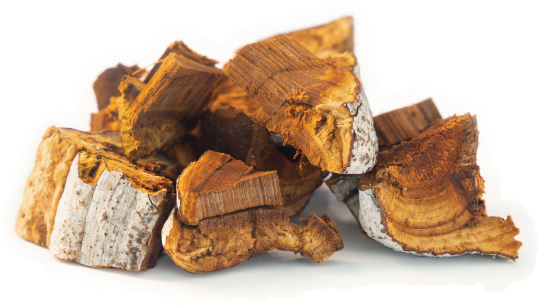The ASCO Post’s Integrative Oncology series is intended to facilitate the availability of evidence-based information on integrative and complementary therapies sometimes used by patients with cancer. In this installment, Ting Bao, MD, DABMA, MS, and Jyothirmai Gubili, MS, explore the current research findings regarding the antioxidant and immunostimulatory effects of chaga mushroom, available in the form of teas and extracts. They note that clinical trials are needed to confirm such effects.

Ting Bao, MD, DABMA, MS

Jyothirmai Gubili, MS
Scientific Name: Inonotus obliquus
Common Names: Cinder conk, Birch conk, clinker polypore
Overview
Prevalent in cold climates, chaga mushroom grows on birch and other trees. It has been used as a folk remedy in Russia, the Baltics, and other northern European countries to treat various ailments, including digestive system disorders, ulcers, as well as cancer. The part used medicinally, known as the conk, consists of wood from the substrate tree and mycelium of the invasive fungus.
Although edible, chaga mushroom is not commonly consumed due to its bitter nature. Instead tea made from the whole mushroom is more popular. Chaga extracts are also marketed as supplements in the form of capsules, tablets, and teas for their antioxidant and immunostimulatory effects. Efforts are underway to develop cultivated substitutes of wild chaga due to overharvesting of natural reserves.1
OF NOTE
Patients and care teams should be aware of the possible risk of nephropathy associated with the use of changa mushroom and its interactions with antiplatelet or anticoagulant drugs as well as with hypoglycemic agents.The Science
Bioactive compounds isolated from chaga include polysaccharides, terpenoids, lignans as well as oxalic, gallic, protocatechuic, and p-hydroxybenzoic acids. Chaga demonstrated antitumor,2 antimutagenic,3 antiviral,4 antiplatelet,5 antidiabetic,6 immunomodulating,7 anti-inflammatory, and pain-relieving properties in vitro.8
Studies in murine models indicate that a chaga extract (0.1, 1.0, and 10.0 mg, administered orally once daily for 21 days; 20 μg or 200 μg, given intraperitoneally on days 0 and 21) inhibited allergen-induced systemic anaphylactic shock. Significant reductions were observed in immunoglobulin E production (P < .01), with intraperitoneal administration reported to be more effective than the oral route.9

Jun J. Mao, MD, MSCE
Another oral extract (50 and 100 mg/kg administered for 7 days) significantly improved learning and memory (P < .01) in scopolamine-induced amnesic mice, likely through its antioxidant property and also by inhibiting acetylcholinesterase.10
And in an experimental colitis model, similar doses of 50 mg/kg and 100 mg/kg, twice a day, for 14 days showed anti-inflammatory effects by suppressing the inflammatory mediators tumor necrosis factor–alpha and inducible NO synthase together with interleukin-1 beta.11
GUEST EDITOR
Integrative Oncology is guest edited by Jun J. Mao, MD, MSCE, Laurance S. Rockefeller Chair in Integrative Medicine and Chief of Integrative Medicine Service at Memorial Sloan Kettering Cancer Center, New York.Chaga polysaccharides (0, 100, 200, and 300 mg/kg/d orally for 14 days) also alleviated fatigue in mice by enhancing swimming time, and the glycogen content of liver and muscle, while decreasing blood lactic acid and serum urea nitrogen levels.12 In addition, these polysaccharides (at a dose of 50 mg/kg orally, once daily, for 4 weeks) decreased fasting plasma glucose levels, enhanced glycometabolism, and regulated inflammatory cytokines in streptozotocin-induced diabetic mice, via modulating oxidative stress and inflammatory factors.13
Chaga has been evaluated for its anticancer potential as well. Its extracts demonstrated inhibitory and proapoptotic properties against colon cancer14 and hepatoma15 cells. Inotodiol, a triterpenoid derived from chaga, exhibited antitumor effects against cervical cancer cells,16 reduced toxicity associated with radiation,17 and inhibited melanoma cell growth in murine models.18 Mechanistic studies revealed that the inhibitory effects of chaga on colorectal cancer cells were due to downregulation of the beta-catenin pathway.19
Inotodiol inhibited proliferation along with inducing apoptosis in cervical cancer cells via increased Bax expression, decreased Bcl-2, downregulated cyclin E, and upregulated p27.16
Results from a small clinical study suggest chaga’s potential to inhibit oxidative stress. An extract, at variable doses of 10 mg/mL to 500 mg/mL, was shown to decrease hydrogen peroxide–induced DNA damage in peripheral lymphocytes derived from healthy individuals (n = 20; P < .001) and those with inflammatory bowel disease (n = 20; P < .001).20 Larger randomized clinical trials are needed to determine the significance of these findings.

Adverse Effects
In a single case report, oxalate nephropathy was associated with ingestion of chaga mushroom powder (4–5 teaspoons daily for 6 months), in a 72-year-old woman with liver cancer.21
Herb-Drug Interactions
Antiplatelet or anticoagulant drugs: Chaga extract inhibited platelet aggregation in a murine model.5 It may also have synergistic effects when used with anticoagulant/antiplatelet drugs. However, the clinical relevance of these findings is not known.
Hypoglycemic agents: In vitro, chaga had additive effects in lowering blood sugar levels.6 Again, the clinical significance of this finding is yet unknown.
Summary
Chaga mushroom tea and extracts have been marketed for their antioxidant and immunostimulatory effects, mainly supported by in vitro and in vivo studies. However, clinical trials are needed to confirm such effects. Patients and care teams should be aware of the possible risk of nephropathy associated with the use of chaga and its interactions with antiplatelet or anticoagulant drugs as well as with hypoglycemic agents. ■
DISCLOSURE: Dr. Bao was on the advisory board of Eisai. Ms. Gubili reported no conflicts of interest.
REFERENCES
1. Sun Y, Yin T, Chen XH, et al: In vitro antitumor activity and structure characterization of ethanol extracts from wild and cultivated Chaga medicinal mushroom, Inonotus obliquus (Pers.:Fr.) Pilat (Aphyllophoromycetideae). Int J Med Mushrooms 13:121-130, 2011.
2. Ning X, Luo Q, Li C, et al: Inhibitory effects of a polysaccharide extract from the Chaga medicinal mushroom, Inonotus obliquus (higher Basidiomycetes), on the proliferation of human neurogliocytoma cells. Int J Med Mushrooms 16:29-36, 2014.
3. Ham SS, Kim SH, Moon SY, et al: Antimutagenic effects of subfractions of Chaga mushroom (Inonotus obliquus) extract. Mutat Res 672:55-59, 2009.
4. Pan HH, Yu XT, Li T, et al: Aqueous extract from a Chaga medicinal mushroom, Inonotus obliquus (higher Basidiomycetes), prevents herpes simplex virus entry through inhibition of viral-induced membrane fusion. Int J Med Mushrooms 15:29-38, 2013.
5. Hyun KW, Jeong SC, Lee DH, et al: Isolation and characterization of a novel platelet aggregation inhibitory peptide from the medicinal mushroom, Inonotus obliquus. Peptides 27:1173-1178, 2006.
6. Ying YM, Zhang LY, Zhang X, et al: Terpenoids with alpha-glucosidase inhibitory activity from the submerged culture of Inonotus obliquus. Phytochemistry 108:171-176, 2014.
7. Ko SK, Jin M, Pyo MY: Inonotus obliquus extracts suppress antigen-specific IgE production through the modulation of Th1/Th2 cytokines in ovalbumin-sensitized mice. J Ethnopharmacol 137:1077-1082, 2011.
8. Park YM, Won JH, Kim YH, et al: In vivo and in vitro anti-inflammatory and anti-nociceptive effects of the methanol extract of Inonotus obliquus. J Ethnopharmacol 101:120-128, 2005.
9. Yoon TJ, Lee SJ, Kim EY, et al: Inhibitory effect of chaga mushroom extract on compound 48/80-induced anaphylactic shock and IgE production in mice. Int Immunopharmacol 15:666-670, 2013.
10. Giridharan VV, Thandavarayan RA, Konishi T: Amelioration of scopolamine induced cognitive dysfunction and oxidative stress by Inonotus obliquus. Food Funct 2:320-327, 2011.
11. Mishra SK, Kang JH, Kim DK, et al: Orally administered aqueous extract of Inonotus obliquus ameliorates acute inflammation in dextran sulfate sodium (DSS)-induced colitis in mice. J Ethnopharmacol 143:524-532, 2012.
12. Yue Z, Xiuhong Z, Shuyan Y, et al: Effect of Inonotus obliquus polysaccharides on physical fatigue in mice. J Tradit Chin Med 35:468-472, 2015.
13. Wang J, Hu W, Li L, et al: Antidiabetic activities of polysaccharides separated from Inonotus obliquus via the modulation of oxidative stress in mice with streptozotocin-induced diabetes. PLoS One 12:e0180476, 2017.
14. Lee HS, Kim EJ, Kim SH: Ethanol extract of Inonotus obliquus (Chaga mushroom) induces G1 cell cycle arrest in HT-29 human colon cancer cells. Nutr Res Pract 9:111-116, 2015.
15. Youn MJ, Kim JK, Park SY, et al: Chaga mushroom (Inonotus obliquus) induces G0/G1 arrest and apoptosis in human hepatoma HepG2 cells. World J Gastroenterol 14:511-517, 2008.
16. Zhao LW, Zhong XH, Yang SY, et al: Inotodiol inhabits proliferation and induces apoptosis through modulating expression of cyclin E, p27, bcl-2, and bax in human cervical cancer HeLa cells. Asian Pac J Cancer Prev 15:3195-3199, 2014.
17. Rasina LN: Effect of cryosubstance Chagi on deposition or isolation of 90Sr and on the effect of prolonged external exposure to gamma-radiation. Radiats Biol Radioecol 42:399-403, 2002.
18. Youn MJ, Kim JK, Park SY, et al: Potential anticancer properties of the water extract of Inonotus [corrected] obliquus by induction of apoptosis in melanoma B16-F10 cells. J Ethnopharmacol 121:221-228, 2009.
19. Kang JH, Jang JE, Mishra SK, et al: Ergosterol peroxide from Chaga mushroom (Inonotus obliquus) exhibits anti-cancer activity by down-regulation of the ß-catenin pathway in colorectal cancer. J Ethnopharmacol 173:303-312, 2015.
20. Najafzadeh M, Reynolds PD, Baumgartner A, et al: Chaga mushroom extract inhibits oxidative DNA damage in lymphocytes of patients with inflammatory bowel disease. Biofactors 31:191-200, 2007.
21. Kikuchi Y, Seta K, Ogawa Y, et al: Chaga mushroom-induced oxalate nephropathy. Clin Nephrol 81:440-444, 2014.

